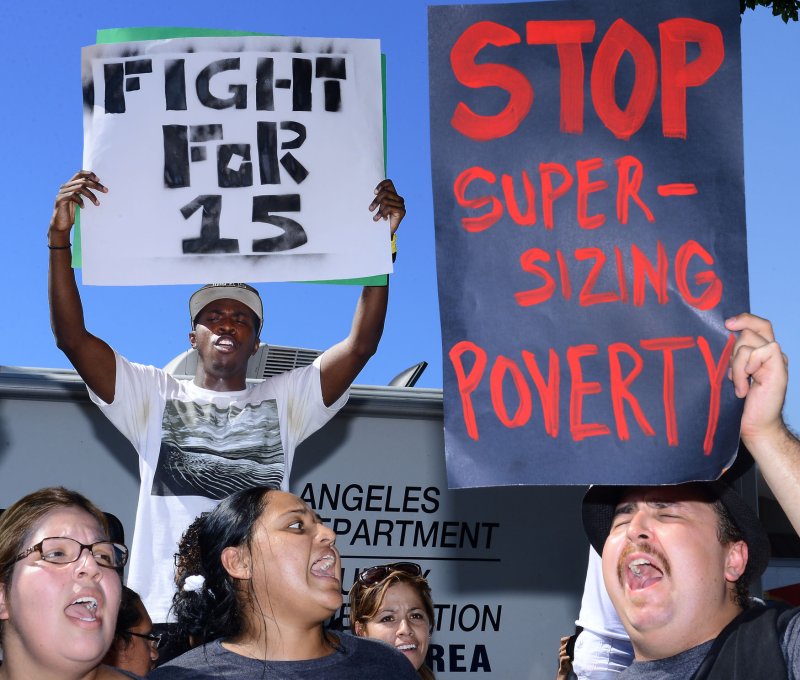Fast food workers in the Los Angeles area on strike in August as part of nationwide attempt to raise the federal minimum wage to $15 per hour and form a union. UPI/Jim Ruymen |
License Photo
CHICAGO, Oct. 27 (UPI) -- While low prices for hamburgers and fries at U.S. fast food restaurants may appear to be good for consumer wallets, the low wages paid to fast-food workers means taxpayers end up paying billions of dollars to cover workers' basic needs, researchers say.
A study by researchers at the University of California at Berkeley and University of Illinois at Urbana-Champaign funded by a labor group campaigning for higher wages says the combination of low wages and few benefits means many fast-food workers have to rely on public assistance.
Workers behind the counters at America's fast-food restaurants are no longer mainly teenagers looking to make a few dollars; 67 percent are adults 20 and older and 68 percent are the main earners in their families. More than a quarter of the front-line workers are raising children.
Researchers say more than half of front-line fast-food workers rely on public assistance to cover basic needs like food, rent and healthcare, costing taxpayers nearly $7 billion a year.
The researchers analyzed public program utilization by working families and estimated total average annual public benefit expenditures on the families of fast-food workers for the years 2007-11. The report focused on non-managerial workers who work at least 11 hours per week for 27 or more weeks per year.
The report was funded by Fast Food Forward, the group campaigning for higher wages and rights for fast food workers. Fast-food workers in 60 cities went on strike earlier this year, calling for wages to be raised to $15 an hour.
"Median pay for core front-line fast-food jobs is $8.69 an hour, with many jobs paying at or near the minimum wage," the report said. An estimated 87 percent do not receive health benefits through their employer.
Researchers said families of fast food workers are enrolled in public programs at more than twice the rate of the overall workforce.
"The taxpayer costs we discovered were staggering," co-author Ken Jacobs, chair of UC Berkeley's Center for Labor Research and Education, said in a statement. "People who work in fast-food jobs are paid so little that having to rely on public assistance is the rule, rather than the exception, even for those working 40 hours or more a week."
More than half (52 percent) of the families of front-line fast-food workers are enrolled in one or more public programs, compared to 25 percent of the workforce as a whole. Spending on Medicaid and the Children's Health Insurance Program, estimated at an average of $3.9 billion per year, accounts for more than half of the costs. Families of fast food workers also receive an annual average of $1.04 billion in food stamp benefits and $1.91 billion in Earned Income Tax Credit payments. Temporary Assistance for Needy Families comes in at $82 million per year
One in five families with a member holding a fast-food job has an income below the poverty line.
Study co-author Marc Doussard, assistant professor of urban and regional planning at the University of Illinois at Urbana-Champaign, said the last recession magnified problems that were already occurring.
"The economy in the 1990s was very good at generating low wage and high wage jobs," Doussard told UPI.
"Fast food stands out because it's a growing industry that pays really low wages," he said. While the issue of fast-food wages and benefits is important in and of itself, it's also part of a broader problem in that most of the job growth since the recession has been in low wage jobs.
If there aren't better paying jobs for low-wage workers to move into, there needs to be something to bridge the gap, he said.
Doussard said it was easier to ignore the issue of low pay and no benefits when the perception was that fast-food workers were just kids working for pocket change.
"It is important that people understand the extent of the problem," he said.
McDonald's defends the current wage and benefit structure, saying it pays employees a competitive wage.
"The fact is that McDonald's and our independent franchisees provide jobs in every state to hundreds of thousands of people across the country. Those jobs range from entry-level part-time to full-time, and we offer everyone the same opportunity for advancement," McDonald's said in a statement. "Our history is full of examples of individuals who worked their first job with McDonald's and went on to successful careers both within and outside of McDonald's."
"As with most small businesses, wages are based on local wage laws and are competitive to similar jobs in that market. We also provide training and professional development opportunities to anyone that works in one of our restaurants."
While the federal minimum wage is $7.25 an hour, some states and municipalities require higher minimum wages -- sometimes much more. In California, Gov. Jerry Brown last month signed legislation to raise California's minimum wage from $8 an hour to $10 by 2016.
Residents of nearby SeaTac, Wash., will vote Nov. 5 on Proposition 1, which would raise the minimum wage to $15 for about 6,300 hospitality and transportation workers at Seattle-Tacoma International Airport. Supporters say it will help lift employees out of poverty while critics say businesses will fire workers, cut hours and/or raise prices.
While higher wages for fast-food workers may result in higher prices for Happy Meals, Doussard said restaurants could recoup some of their costs through higher productivity.
"When you pay workers low wages they don't stay on the job very long," he said, pointing to the cost of hiring, firing and training employees.
A stable workforce means "you lose less product, workers are more invested and you cut down on hiring and firing," he said.















